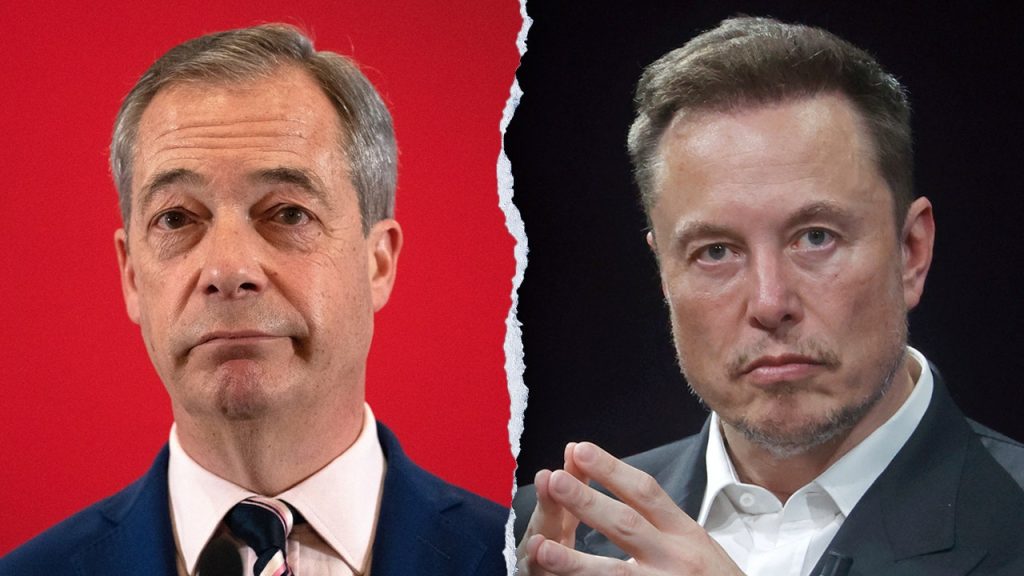Elon Musk’s recent foray into British politics has ignited a public disagreement with Nigel Farage, the leader of the Reform UK Party, regarding the party’s leadership and the controversial figure of Tommy Robinson. Musk, the influential business tycoon, publicly declared on X (formerly Twitter) that Farage lacks the necessary qualities to lead Reform UK and should be replaced. This sparked a direct rebuttal from Farage, who, while acknowledging Musk’s remarkable achievements, firmly disagreed with his assessment. Farage reiterated his stance against Robinson’s involvement in the party, emphasizing his commitment to his principles. This exchange highlights a divergence of opinions between two prominent figures, each with significant influence in their respective spheres.
The core of the disagreement revolves around the potential role of Tommy Robinson, whose real name is Stephen Yaxley-Lennon, within the Reform UK Party. Musk has expressed support for Robinson, who is currently incarcerated. Farage, however, has explicitly stated his opposition to Robinson’s inclusion in the party. This difference in perspective is central to the public clash between Musk and Farage. While Musk seemingly advocates for Robinson’s inclusion, likely due to Robinson’s outspoken views on certain issues that align with Musk’s own, Farage maintains a firm stance against it, possibly due to concerns about Robinson’s controversial past and the potential negative impact his association could have on the party’s image and electoral prospects.
Farage has clarified that Robinson’s imprisonment stems from contempt of court, not from his activism related to grooming gangs, as some might believe. This clarification underscores the complexities surrounding Robinson’s case and the differing interpretations of his actions. While Musk acknowledges the official reason for Robinson’s imprisonment, he also expresses his disapproval of the length of the sentence and the use of solitary confinement. This reveals a nuanced perspective from Musk, suggesting that while he may not fully endorse Robinson’s actions that led to his imprisonment, he questions the severity of the punishment.
The public exchange between Musk and Farage underscores the broader debate about freedom of speech, political activism, and the role of controversial figures in public life. Musk’s support for Robinson, despite his legal troubles, can be interpreted as a defense of free speech, even for those with controversial views. Farage’s resistance to Robinson’s involvement in Reform UK, on the other hand, reflects a pragmatic approach to politics, prioritizing the party’s image and electoral viability over embracing potentially divisive figures.
This episode also highlights the increasing interconnectedness of global figures and their influence on political discourse in different countries. Musk, an American entrepreneur, has weighed in on British politics, demonstrating the far-reaching impact of social media and the ability of prominent individuals to transcend geographical boundaries and engage in political debates across nations. This underscores the evolving landscape of political influence in the digital age, where individuals with large online platforms can exert significant influence on public opinion and political discussions, regardless of their national affiliation.
Furthermore, Musk’s strong support for Donald Trump during the 2024 US presidential election and his claim that a Trump loss would equate to a loss of civilization adds another layer of complexity to his political pronouncements. This statement reveals Musk’s deeply held political convictions and his belief in Trump’s crucial role in preserving societal values. This fervent support for Trump, coupled with his intervention in British politics, paints a picture of Musk as a politically engaged individual willing to express strong opinions on both domestic and international matters. His actions illustrate the increasing tendency of influential figures from non-political backgrounds to leverage their platforms to engage in political discourse and shape public opinion.

